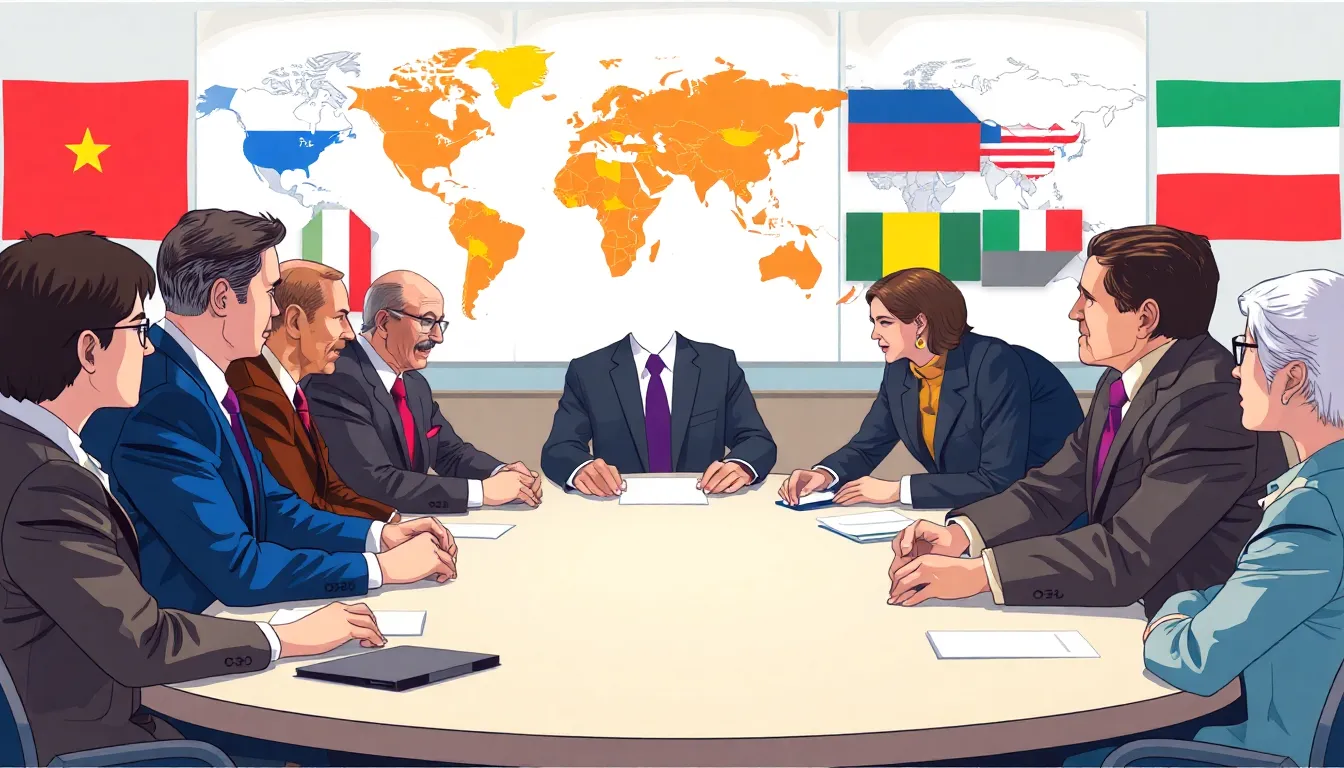In a world where borders blur and cultures collide, understanding global affairs isn’t just a luxury—it’s a necessity. Imagine trying to navigate a complex maze without a map; that’s what it feels like to engage with international relations without grasping their definition. Global affairs encompass everything from diplomacy and trade to environmental concerns and human rights. It’s the ultimate game of chess played on a worldwide scale, and everyone’s invited to take a seat at the table.
But don’t worry, you don’t need a PhD in political science to join the conversation. Whether you’re a curious novice or a seasoned expert, knowing what global affairs really means can empower you to make sense of the chaos. So buckle up and get ready to dive into the fascinating world of global dynamics, where every event could be the next big headline—and who doesn’t want to be in the know?
Table of Contents
ToggleUnderstanding Global Affairs Definition
Global affairs encompass a vast array of topics crucial in today’s interconnected environment. It involves diplomacy, trade, environmental issues, and human rights, reflecting a dynamic framework essential for global interaction.
Key Components of Global Affairs
Diplomacy plays a central role in fostering relationships between nations. Trade facilitates economic partnerships and encourages the flow of goods and services. Environmental issues highlight the need for cooperative efforts to address climate change. Human rights discussions aim to uphold freedoms and dignities across different societies. Each component contributes significantly to the overall landscape of global affairs.
Importance of Global Affairs
Understanding global affairs enables individuals to navigate complex international dynamics. Engaging in discussions about these topics fosters informed citizens, promoting awareness of critical issues. Global affairs shape policies impacting everyday lives, from trade agreements to environmental regulations. Awareness of these subjects encourages active participation in civic duties. Being informed about global events empowers individuals to contribute meaningfully to discussions and collaborative solutions.
Historical Context of Global Affairs

Global affairs have evolved significantly, reflecting historical changes and events that shaped the international landscape. Understanding this context helps in grasping the complexities of current global interactions.
Evolution Over Time
Global affairs progressed from ancient diplomatic practices to modern complexities. Early civilizations engaged in trade and treaties, forming foundational diplomatic relationships. The Peace of Westphalia in 1648 established sovereignty principles, impacting state interactions. The emergence of international organizations in the 20th century, particularly the United Nations, marked a significant transition towards cooperative global governance. Subsequent developments, like globalization and technological advancements, shaped contemporary relations, emphasizing the interdependence of nations.
Major Events Shaping Global Affairs
Key events have profoundly influenced the trajectory of global affairs. World War I and World War II led to significant geopolitical shifts, prompting a greater focus on international cooperation. The Cold War era introduced ideological divisions, impacting global alliances. The fall of the Berlin Wall in 1989 symbolized the end of a divided world, promoting democratic values. More recently, events such as the September 11 attacks and the COVID-19 pandemic demonstrated the interconnectedness of nations and the importance of collaborative responses to global challenges. These events underscored how external pressures shape policies and narratives across borders.
The Role of International Organizations
International organizations play a crucial part in shaping global affairs. These entities facilitate dialogue, promote peace, and foster cooperation among nations.
United Nations and Global Affairs
The United Nations (UN) serves as the primary international organization addressing diverse global challenges. Established in 1945, the UN focuses on maintaining peace and security while promoting human rights and fostering social progress. Numerous specialized agencies under the UN umbrella tackle issues such as health, education, and environmental sustainability. The UN’s peacekeeping missions exemplify its commitment to resolving conflicts and stabilizing nations in crisis. Additionally, forums like the General Assembly enable member states to discuss and collaborate on pressing global issues, enhancing diplomatic relations across the world.
Impact of Non-Governmental Organizations
Non-governmental organizations (NGOs) significantly influence global affairs by addressing critical humanitarian and environmental issues. These groups advocate for social justice, provide disaster relief, and promote sustainable development initiatives. NGOs often operate independently from governments, allowing them to serve as watchdogs and amplify the voices of marginalized communities. Their grassroots efforts frequently lead to policy changes and increased public awareness regarding global challenges. Collaborations between NGOs and international organizations enhance the effectiveness of solutions to issues such as climate change and human rights abuses, making them key players in the international arena.
Contemporary Issues in Global Affairs
Contemporary global affairs encompass a range of pressing issues that require collaborative international responses. Among these, climate change and geopolitical tensions stand out.
Climate Change and Global Cooperation
Climate change poses significant threats to the planet, driving nations to unite for effective solutions. Global temperatures continue to rise, impacting agricultural yields and water supplies. The Paris Agreement highlights international attempts to curb emissions, yet disparities in commitments exist among countries. Developed nations often face pressure to provide financial assistance to developing nations, enabling them to adopt sustainable practices. Collaborative efforts, such as climate summits, facilitate dialogue and foster shared responsibilities. Understanding the urgency of climate action necessitates global cooperation, emphasizing collective action as essential for future survival.
Geopolitical Tensions
Geopolitical tensions shape the landscape of international relations, often driven by territorial disputes and resource competition. Conflicts in regions like the South China Sea illustrate disputes over maritime boundaries, impacting trade routes and security. Rivalries between major powers complicate diplomatic relations, as seen in the ongoing tensions between the U.S. and Russia. These dynamics influence global alliances and encourage nations to rethink their strategies. Economic sanctions frequently emerge as tools to exert pressure in conflict situations. Navigating these tensions requires diplomacy and dialogue to reduce risks of escalation and promote stability in the international arena.
Understanding global affairs is vital for anyone looking to navigate today’s complex international landscape. It encompasses a broad range of topics from diplomacy to environmental issues and human rights. Engaging with these subjects empowers individuals to contribute to meaningful discussions and solutions that affect their lives and communities.
As global challenges continue to evolve, staying informed about these dynamics becomes increasingly important. The interconnectedness of nations demands active participation and awareness. By fostering a deeper understanding of global affairs, individuals can play a significant role in shaping a more collaborative and equitable world.



